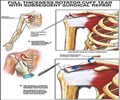Previous research has shown that methicillin resistant staph aureus (MRSA) infections are antibiotic-resistant and can cause innumerable problems like bone erosion

Although only 2 percent of the American population that undergo total joint replacement surgery will suffer an infection, half of those infections are from MRSA.
The results of a MRSA infection after a total joint replacement can be devastating.
Currently, there is no effective treatment for MRSA-infected implants. With the increasing incidence of total joint replacement surgeries, the prevalence of MRSA-infected implants is expected to rise.
A team of investigators from the University of Rochester Medical Center has developed a vaccine that can prevent bacterial infection of orthopaedic implants.
The team, led by Edward Schwarz, PhD, Professor of Orthopaedics and Associate Director of the Center for Musculoskeletal Research, has generated an antibody that prevents MRSA bacteria from dividing properly.
Advertisement
He explained that if the cell wants to divide, it has to "unzip the cell wall" to break into two "daughter cells." Their team produced an antibody that targets a component of the zipper, Gmd-preventing normal bacterial cell division by causing them to form clusters of cells.
Advertisement
Further analysis found that the antibody prevented formation of sequestrum, or a piece of dead bone, which is a hallmark of osteomyelitis. Additionally, immunization led to decreased bacterial presence on the pins themselves.
Based on these findings, this immunization appears to be a promising treatment to prevent the MRSA infection/reinfection of orthopaedic implants.
Source-ANI














